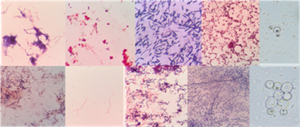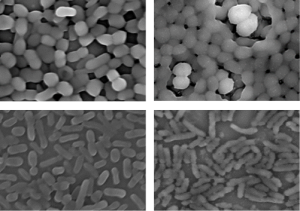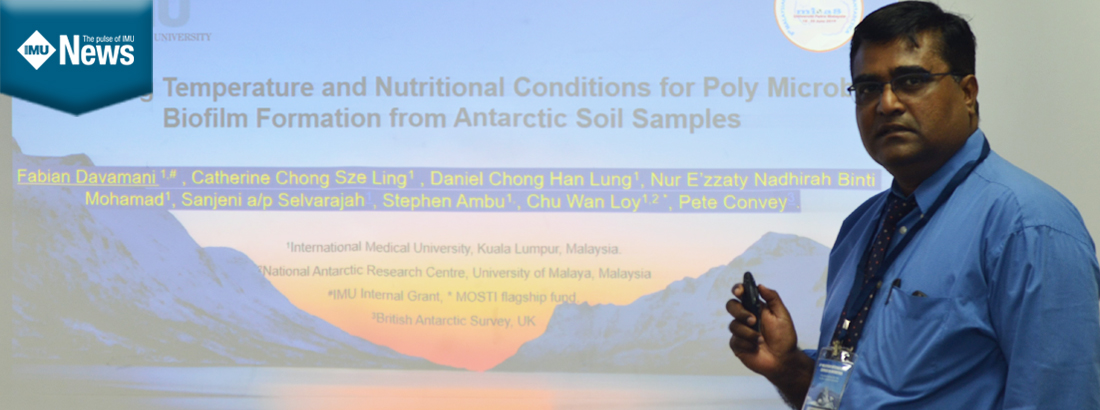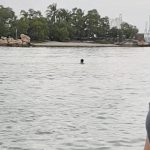18-19 June 2019 – IMU Faculty, Dr Amalraj Fabian Davamani, presented his research on “Poly Microbial Biofilm Formation from Antarctic Soil Samples” at the 8th Malaysian International Seminar on Antarctica (MISA) at Universiti Putra Malaysia (UPM). MISA is a biennial event which gathers researchers from different countries to share findings and experiences in polar research as well as to strengthen existing and forge new collaborations. Participants who were from Malaysia and abroad include eminent personalities who had worked for several decades in Antarctic based research. The research deliberated on the adaptability of Antarctic microbes which can lead to bacterial resilience due to global climatic changes and high rate of ice melting. Soil dwelling bacteria from environmental sources cause infections like tetanus, anthrax, melioidosis, Legionellosis, botulism, gastrointestinal infection, wound, skin, and respiratory tract diseases and sepsis. Harsh microenvironments could promote pathogenesis, hence soil bacteria has relevance to human health.  The study involved culturing bacteria from Antarctic soil and looking for virulence factor like biofilm formation. The research findings in our laboratory conditions depicts the possibility of Antarctic bacterial biofilms in the soils. The biofilms are like protective coating of extra cellular matrix, which can protect the microbes under adverse conditions and help in colonisation and establishment. The biofilms consisted of multiple microorganisms, which is termed as poly microbial biofilms. The bacteria in biofilms from the soil could possibly run down from the surface during rain/snow melting process and reach the seawater and get dissipated across the globe due to ocean currents and re-establish in another ideal geographical area.
The study involved culturing bacteria from Antarctic soil and looking for virulence factor like biofilm formation. The research findings in our laboratory conditions depicts the possibility of Antarctic bacterial biofilms in the soils. The biofilms are like protective coating of extra cellular matrix, which can protect the microbes under adverse conditions and help in colonisation and establishment. The biofilms consisted of multiple microorganisms, which is termed as poly microbial biofilms. The bacteria in biofilms from the soil could possibly run down from the surface during rain/snow melting process and reach the seawater and get dissipated across the globe due to ocean currents and re-establish in another ideal geographical area.  The research findings were discussed and proof of microbial biofilm formation from Antarctic soil bacteria was established, it was also established that the Antarctic bacteria can grow and survive under extreme diet just with saline water, the topic was well received and discussed. The oral presentation was well received by the delegates with the high accolades and appreciated by the chairperson. Attending the conference is also an opportunity to learn a lot about the changing climatic conditions, proteins from Antarctic microbes with potential therapeutic values, anti-freeze proteins purified from Antarctic microbes have pragmatic applications. Learning from other researchers is an eye opener for one to see the expanse research, naturally kindle one’s curiosity. The project was funded by IMU internal grants (Dr Fabian Davamani) and MOSTI flagship fund (Prof Chu Wan Loy). The opportunity to participate and present a paper in the conference facilitated by IMU is highly appreciated.
The research findings were discussed and proof of microbial biofilm formation from Antarctic soil bacteria was established, it was also established that the Antarctic bacteria can grow and survive under extreme diet just with saline water, the topic was well received and discussed. The oral presentation was well received by the delegates with the high accolades and appreciated by the chairperson. Attending the conference is also an opportunity to learn a lot about the changing climatic conditions, proteins from Antarctic microbes with potential therapeutic values, anti-freeze proteins purified from Antarctic microbes have pragmatic applications. Learning from other researchers is an eye opener for one to see the expanse research, naturally kindle one’s curiosity. The project was funded by IMU internal grants (Dr Fabian Davamani) and MOSTI flagship fund (Prof Chu Wan Loy). The opportunity to participate and present a paper in the conference facilitated by IMU is highly appreciated.









